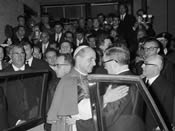The four weeks of Advent should then be for each of us a time of preparation to ensure that this Christmas will not find the Holy Family out in the cold—“because there was no room for them in the inn” (Lk 2:7)—without room in our heart; because it is filled with ourself, because it is tied to creatures in disregard of the Creator. Like the season of Lent, Advent must also be a time for raising the level of our life of prayer, penance (mortification) and almsgiving (good works)—which explains why both seasons share the same liturgical color (violet)—to cure our so-called “three-fold concupiscence” which is, as St. John the Apostle writes, “the lust of the flesh, the lust of the eyes, and the pride of life” (1 Jn 2:16).
The effort to rid ourselves of our three-fold conscupiscence is another way of expressing the lifelong struggle towards sanctification, which is not “optional” in the sense that we can afford to choose not to take it, because the alternative is not to be united with God in eternity—to be separated forever from God Who alone can satisfy the deepest yearnings of our being—which is eternal misery or hell.
We will not enjoy union with God in eternity if we did not learn to be united with God in this life, which means to grow in our knowing God (with the intelligence enlightened by faith), loving God (with our human freedom aided by God’s grace), and serving God with all our being (fulfilling God’s Will with all our strength, all our passions, all our possessions, all our relations and dealings). This is incompatible with “lust of the flesh”: a “bourgeois” (“townsman” and, therefore, “comfortable”) existence; love of comfort and abhorrence of pain and suffering, and the liberal, modernist, materialistic and earthbound philosophies that absolutize these. Sanctification is also incompatible with “lust of the eyes”: avarice, the inordinate desire to possess, or attachment to worldly things. Most of all, sanctification is incompatible with “pride of life”: an attitude of self-sufficiency that excludes God from one’s existence and plans.
St. Josemaria writes:
“You and I belong to Christ's family, for 'he himself has chosen us before the foundation of the world, to be saints, to be blameless in his sight, for love of him, having predestined us to be his adopted children through Jesus Christ, according to the purpose of his Will'. We have been chosen gratuitously by Our Lord. His choice of us sets us a clear goal. Our goal is personal sanctity, as St Paul insistently reminds us, haec est voluntas Dei: sanctificatio vestra, 'this is the Will of God: your sanctification'. Let us not forget, then, that we are in our Master's sheepfold in order to achieve that goal….The goal that I am putting before you, or rather that God has marked out for us all, is no illusory or unattainable ideal. I could quote you many specific examples of ordinary men and women, just like you and me, who have met Jesus passing by quasi in occulto, at what appeared to be quite ordinary cross-roads in their lives, and have decided to follow him, lovingly embracing their daily cross. In this age of ours, an age of generalised decay, of compromise and discouragement, and also of licence and anarchy, I think it is more important than ever to hold on to that simple yet profound conviction which I had when I began my priestly work and have held ever since, and which has given me a burning desire to tell all mankind that 'these world crises are crises of saints'….Interior life. We need it, if we are to answer the call that the Master has made to each and every one of us. We have to become saints, as they say in my part of the world, 'down to the last whisker,' Christians who are truly and genuinely such, the kind that could be canonised. If not, we shall have failed as disciples of the one and only Master. And don't forget that when God marks us out and gives us his grace to strive for sanctity in the everyday world, he also puts us under an obligation to do apostolate. I want you to realise that, even looking at things humanly, concern for souls follows naturally from the fact that God has chosen us. As one of the Fathers of the Church points out, 'When you discover that something has been of benefit to you, you want to tell others about it. In the same way, you should want others to accompany you along the ways of the Lord. If you are going to the forum or the baths and you run into someone with time on his hands, you invite him to go with you. Apply this human behaviour to the spiritual realm and, when you go towards God, do not go alone.'” (Friends of God, Nos. 2-5)
It is fitting that the Solemnity of the Immaculate Conception falls within the season of Advent. Mary’s perfection demonstrates the possibility of real union with God by God’s grace and our free cooperation. While she was never contaminated by our three-fold concupiscence, Mary was still free (all the more so!), with that human freedom by which Adam and Eve turned away from God; but which, in Mary’s case, with her Fiat, made possible the Redemption of mankind.
O.C.P.A.J.P.M.








